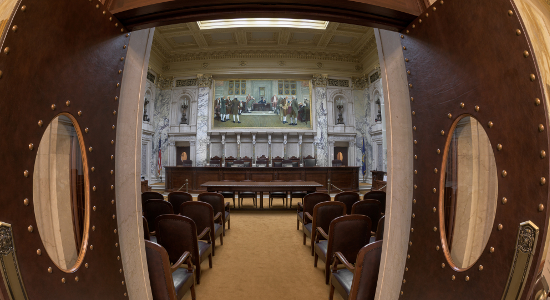
Dec. 23, 2020 – The Wisconsin Supreme Court (4-3) recently denied an original action petition challenging a Dane County order that placed restrictions on business and indoor sports activities and prohibited indoor gatherings of extended family and friends.
Emergency Order 10, addressing the ongoing COVID-19 pandemic, expired on Dec. 16, 2020. A ruling from the supreme court may have addressed the county’s authority to issue such emergency orders in the future. But a majority declined to hear it.
The petitioners – a gymnastics center incorporated as Gymfinity Ltd., as well as parents of children who participate in youth hockey and soccer clubs – attempted to skip the lower courts with an emergency petition for original action to the state supreme court
But Justice Brian Hagedorn joined Justice Ann Walsh Bradley, Justice Rebecca Dallet, and Justice Jill Karofsky to form a majority denial in
Gymfinity Ltd. v. Dane County.
Justice Hagedorn, in a concurring opinion, said the state’s highest court should not step into the case at this early stage, noting the petition raises significant issues “but multiple claims would seem to turn on questions of fact.”
“I am also concerned that inserting ourselves into early stage litigation of local regulations where the possible applications are complex and unknown could entrap us in the tangled web of passing judgment on all kinds of local restrictions for as long as COVID-19 endures,” he wrote. “We are simply not equipped for that; circuit courts are.”
Chief Justice Patience Roggensack, in a dissenting opinion joined by Justice Annette Ziegler and Justice Rebecca Bradley, said the court should step in now.
“While this court has recently received a barrage of petitions to commence original actions, when it is presented to us that fundamental personal liberty is suppressed by an unelected official, we must act,” Chief Justice Roggensack wrote. “Waiting until the matter proceeds through a circuit court and the court of appeals will be justice denied.”
New Dane County Order
Dane County
Emergency Order 11, effective until Jan. 13, 2021, allows gatherings inside private homes of 10 people or less with physical distancing but still prohibits games and competitions between teams in medium and high risk sports.
High risk sports are those with close, sustained contact. Medium risk sports are those with close, sustained contact, but with protective equipment in place, such as face shields, that may reduce the likelihood of respiratory particle transmission.
Clubs can conduct intra-team scrimmages in medium and high-risk sports if the games and competitions are modified to ensure physical distancing is maintained at all times. Games and competitions in low-risk sports, such as tennis, are allowed.
 Joe Forward, Saint Louis Univ. School of Law 2010, is a legal writer for the State Bar of Wisconsin, Madison. He can be reached by
email or by phone at (608) 250-6161.
Joe Forward, Saint Louis Univ. School of Law 2010, is a legal writer for the State Bar of Wisconsin, Madison. He can be reached by
email or by phone at (608) 250-6161.
The new order continues to mandate face masks, with exceptions, in enclosed buildings outside the home, and while driving with people other than members of the household.
It also addresses child care settings, schools, and continues capacity and other restrictions and staffing limitations on businesses in Dane County.
Petitioners Argued Unlawful Delegation
The petitioners’ argument reflects the ongoing friction, seen across the nation, between government authority to deal with public health emergencies and individual rights.
The petitioners argued that Dane County and the City of Madison “unlawfully delegated near limitless legislative power to their local health officer to do whatever she deems reasonable and necessary’ to combat the COVID-19 pandemic.”
Petitioners also offered statutory and constitutional arguments, such as whether restricting gatherings in private homes violates a constitutional right of association.
“Because personal liberty interests must be protected when brought to this court's attention, and it is argued to us that Heinrich's orders repeatedly contravene personal liberty interests, I would grant the petition to commence an original action in this matter,” wrote Chief Justice Roggensack in her dissenting opinion.
However, since a majority declined to hear the case as an original action, petitioners must file in circuit court before working through the appellate courts.
